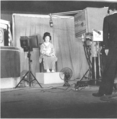Portal:Television
The Television Portal

Television (TV) is a telecommunication medium for transmitting moving images and sound. Additionally, the term can refer to a physical television set rather than the medium of transmission. Television is a mass medium for advertising, entertainment, news, and sports. The medium is capable of more than "radio broadcasting," which refers to an audio signal sent to radio receivers.
Television became available in crude experimental forms in the 1920s, but only after several years of further development was the new technology marketed to consumers. After World War II, an improved form of black-and-white television broadcasting became popular in the United Kingdom and the United States, and television sets became commonplace in homes, businesses, and institutions. During the 1950s, television was the primary medium for influencing public opinion. In the mid-1960s, color broadcasting was introduced in the U.S. and most other developed countries.
In 2013, 79% of the world's households owned a television set. The replacement of earlier cathode-ray tube (CRT) screen displays with compact, energy-efficient, flat-panel alternative technologies such as LCDs (both fluorescent-backlit and LED), OLED displays, and plasma displays was a hardware revolution that began with computer monitors in the late 1990s. Most television sets sold in the 2000s were still CRT, it was only in early 2010s that flat-screen TVs decisively overtook CRT. Major manufacturers announced the discontinuation of CRT, Digital Light Processing (DLP), plasma, and even fluorescent-backlit LCDs by the mid-2010s. LEDs are being gradually replaced by OLEDs. Also, major manufacturers have started increasingly producing smart TVs in the mid-2010s. Smart TVs with integrated Internet and Web 2.0 functions became the dominant form of television by the late 2010s.[better source needed] (Full article...)
Selected article -
Selected image -

W2XBS, Schenectady, New York. In 1928, Felix the Cat was one of the first images ever broadcast by television when RCA chose a papier-mâché Felix doll for an experimental broadcast on W2XBS. The doll was chosen for its tonal contrast and its ability to withstand the intense lights needed in early television and was placed on a rotating phonograph turntable and televised for about two hours each day. The doll remained on the turntable for nearly a decade as RCA fine-tuned the picture's definition, and converted to electronic television.
Did you know (auto-generated) -

- ... that Paul Dini was a writer for both the animated television series Batman: The Animated Series and the video game series Batman: Arkham?
- ... that former CIA agent Bazzel Baz was hired to be a consultant for The Blacklist television series and instead became a cast member?
- ... that Svalbard Minute by Minute, a 221-hour-long television broadcast, is credited with increasing tourism in Svalbard by 25 percent?
- ... that Uncle Waffles learned how to DJ during the COVID-19 lockdowns, and then retired from being an Eswatini TV presenter once her music career took off?
- ... that when Florida television station WITV ceased broadcasting in May 1958, its owner was reported to be on a yacht at sea and thus unavailable for comment?
- ... that a television station spent so little on programming that a media columnist called it the "IOUs of Cincinnati"?
Selected quote -
More did you know
- ...that the title of Dan Castellaneta's album of comedy sketches I Am Not Homer is a parody of Leonard Nimoy's first autobiography I Am Not Spock?
- ...that the 1994 Guinness television advertisement Anticipation used jump cutting techniques to make an actor appear to be performing a physically impossible dance?
- ...that Black Entertainment Television comedy series We Got to Do Better, had its name changed from Hot Ghetto Mess amidst allegations of enforcing negative stereotypes of African Americans?
- ...that Olivia Newton-John made at least 16 appearances on The Go!! Show, an Australian popular music television series which aired between 1964 to 1967, before she found international success?
- ...that the television series ER aired an episode based on the 2003 Chicago balcony collapse?
Selected biography -
William Bradley Pitt (born December 18, 1963) is an American actor and film producer. He is the recipient of various accolades, including two Academy Awards, two British Academy Film Awards, two Golden Globe Awards, and a Primetime Emmy Award. One of the most influential celebrities, Pitt appeared on Forbes' annual Celebrity 100 list from 2006 to 2008, and the Time 100 list in 2007.
Pitt first gained recognition as a cowboy hitchhiker in the Ridley Scott road film Thelma & Louise (1991). Pitt emerged as a star taking on leading man roles in films such as the drama A River Runs Through It (1992), the western Legends of the Fall (1994), the horror film Interview with the Vampire (1994), and the crime thriller Seven (1995). Pitt found greater commercial success starring in Steven Soderbergh's heist film Ocean's Eleven (2001), and reprised his role in its sequels. He cemented his leading man status starring in blockbusters such as the historical epic Troy (2004), the romantic crime film Mr. & Mrs. Smith (2005), the horror film World War Z (2013), and the action film Bullet Train (2022). (Full article...)
General images
News
- December 28: US professional wrestler Jon Huber dies aged 41
- September 2: Tributes paid to recently deceased US actor Chadwick Boseman
- May 24: Japanese professional wrestler and Netflix star Hana Kimura dies aged 22
- January 16: BBC newsreader Alagiah to undergo treatment for bowel cancer
- Upcoming events
Featured content
Main topics
History of television: Early television stations • Geographical usage of television • Golden Age of Television • List of experimental television stations • List of years in television • Mechanical television • Social aspects of television • Television systems before 1940 • Timeline of the introduction of television in countries • Timeline of the introduction of color television in countries
Inventors and pioneers: John Logie Baird • Alan Blumlein • Walter Bruch • Alan Archibald Campbell-Swinton • Allen B. DuMont • Philo Taylor Farnsworth • Charles Francis Jenkins • Boris Grabovsky • Paul Gottlieb Nipkow • Constantin Perskyi • Boris Rosing • David Sarnoff • Kálmán Tihanyi • Vladimir Zworykin
Technology: Comparison of display technology • Digital television • Liquid crystal display television • Large-screen television technology • Technology of television
Terms: Broadcast television systems • Composite monitor • HDTV • Liquid crystal display television • PAL • Picture-in-picture • Pay-per-view • Plasma display • NICAM • NTSC • SECAM
Categories
WikiProjects

|
You are invited to participate in WikiProject Television, a WikiProject dedicated to developing and improving articles about Television. |
- Main projects
- Sub-projects
Television Stations • American animation • American television • Australian television • British TV • BBC • Canadian TV shows • Television Game Shows • ITC Entertainment Productions • Digimon • Buffyverse • Doctor Who • Degrassi • EastEnders • Episode coverage • Firefly • Futurama • Grey's Anatomy • Indian television • Lost • Nickelodeon • The O.C. • Professional Wrestling • Reality TV • The Simpsons • Seinfeld • South Park • Stargate • Star Trek • Star Wars • Soap operas • Avatar: The Last Airbender • House
- Related projects
Animation • Anime and manga • Comedy • Comics • Fictional characters • Film • Media franchises
What are WikiProjects?
Things you can do

- Place the {{WikiProject Television}} project banner on the talk pages of all articles within the scope of the project.
- Write: Possible Possum
- Cleanup: color television, Alien Nation: Body and Soul, The Sopranos, Alien Nation: Dark Horizon, Alien Nation: The Enemy Within, Alien Nation: Millennium, Aang
- Expand: Timeline of the introduction of color television in countries
- Stubs: Flow (television), Just for Kicks (TV series), Play of the Month, Nova (Dutch TV series), More stubs...
Subportals
Related portals
Associated Wikimedia
The following Wikimedia Foundation sister projects provide more on this subject:
-
Commons
Free media repository -
Wikibooks
Free textbooks and manuals -
Wikidata
Free knowledge base -
Wikinews
Free-content news -
Wikiquote
Collection of quotations -
Wikisource
Free-content library -
Wikiversity
Free learning tools -
Wiktionary
Dictionary and thesaurus
































































